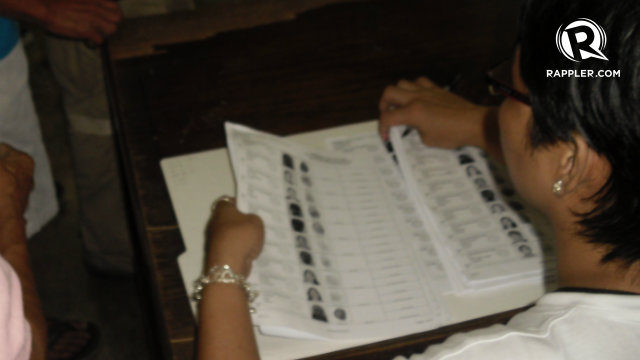SUMMARY
This is AI generated summarization, which may have errors. For context, always refer to the full article.

MANILA, Philippines – In preparation for the coming elections, more funds have been allocated for the purchase of PCOS machines than to the teachers/board of electoral inspectors (BEI) who are going to handle them.
The Commission on Elections (Comelec) allotted an estimated P1.8 billion (Erratum: we had mistakenly used “million” instead of billion. We regret the error.) for the purchase of the PCOS machines that will be used in the automated electoral system (AES). On the other hand, they released about P1.2 billion for the payment of salaries of teachers who will sit in the BEIs, inclusive of their training allowance and honorarium.
The Department of Budget and Management (DBM) allocated P8.2 billion from the General Appropriations Act (GAA) 2013 for the Comelec. This was after the finance department decided to reduce the Comelec budget when the poll body purchased old automated election machines instead of leasing new ones.
Fortunately for the Comelec, in January 2013, the DBM supplemented the existing Comelec budget allocation and released an additional P4.14 billion from the unutilized appropriation of 2012.
Cost-cutting
However, despite the additional budget release, Comelec admitted to resorting to various cost-cutting schemes for the upcoming elections in lieu of the small budget that was allegedly appropriated for the Commission.
In fact, the BEIs are one of the direct targets of these cost-cutting efforts by the Comelec, reflected in the budget allotted for their training and compensation.
The Comelec reduced the teachers’ compensation from P4,300 to P4,000 this year. The figure is broken down as P3,000 for service, P500 for transportation and P500 for final testing and sealing (FTS) allowance. This is separate from the P1,200 that they received for their allowance during the PCOS training.
Teaching the teachers
Rodel Costuna, a chairman of BEIs in Lagro Elementary School, told Rappler that groups of BEIs from other schools were merged in their training for the handling of PCOS machines.
“Supposedly, magkahiwalay ng grupo. Sabi nung parang in-charge na Comelec dito sa district namin, ‘nagtitipid ang Comelec, kulang ng speakers’, so minerge na lang ang grupo, e `di biglang laki talaga yung grupo,” Costuna explained.
(Supposedly, the groups are separate. The officer-in-charge in the Comelec in our district said “the Comelec is saving money, we are lacking speakers,’ so they merged the groups resulting in a bigger group that has to be supervised.”)
The larger clustered group of BEIs in the training led to a limited time for individual practice and hands-on training.
“Halos hindi kami nakakuha ng sarili naming unit para paglaruan or pag praktisan kasi nakuha na ng ibang schools eh. Yung sa ‘min, padungaw dungaw lang kami kung ano yung ginagawa nila,” Costuna told Rappler. (We weren’t able to secure our own unit. We just observed what the others were doing because we were too many.)
For Costuna who already went through the AES training in the 2010 elections, the training was sufficient. He, however, expressed his concern for those who will be handling the machines for the first time.
The BEIs had a two-day training with the Comelec for the handling of PCOS machines. They received their allowance for the training right after it was concluded.
“Ang maganda naman sa Comelec, after training palang, binibigay kaagad yung (allowance sa) 2-day training namin, last year and sa ngayon,” Costuna said. (What is commendable with the COMELEC is that they released the allowance right after the training during the 2010 elections and this year’s elections.)
More voters, less compensation

According to Comelec records, more than 230,000 teachers are expected to serve as BEIs to more than 52 million registered voters this year. They are distributed to 77,904 precincts throughout the country.
The number of registered voters for the coming elections increased from almost 50 million in the 2010 elections to 52 million in 2013. This increase is reflected in the supplemented number of precincts that BEIs are expected to supervise.
For Costuna, he will be handling more precincts than in the previous elections. From 5 precincts, Costuna will be supervising 7 precincts per cluster. This did not translate into a higher honorarium however because according to the Comelec, not everyone votes.
“The same pa rin ang sweldo. Kasi ang philosophy ng Comelec naman talaga hindi naman daw lahat boboto. So parang ganon din. Dating 5 precincts ginawang 7 tapos sabi nila di naman lahat boboto,” Costuna said. (The compensation remains the same. This is because Comelec believes that not everyone is going to vote. From 5 precincts, I will be handling 7 now and Comelec said that not everyone is going to vote.)
Fair enough?
When asked about the compensation that they are going to receive, Costuna said that it is “fair enough.” He added that automated elections are better than the previous electoral system where everything was done manually because “the manual system of elections is susceptible to harassment.”
However, Alliance of Concerned Teachers representative Congressman Antonio Tinio thinks otherwise. He said compensation is not enough. “We spent something like how many billions on automation but not enough for the people who run an election.” – Rappler.com
Visit #PHvote, Rappler’s coverage of the 2013 Philippine elections.
Get to know the candidates through our comprehensive profile pages.
Check out our fun timeline to find interesting trivia on the candidates.
Help us monitor violence & vote buying! Report them through #VoteWatch and our tool will automatically map your report.
First time voter? Learn how to vote by viewing our interactive infographic: Voting 101
Share this page and pledge to #votesmart by clicking on the button below.
|
|
|
|
|
|
|
|
|
|
Add a comment
How does this make you feel?
There are no comments yet. Add your comment to start the conversation.